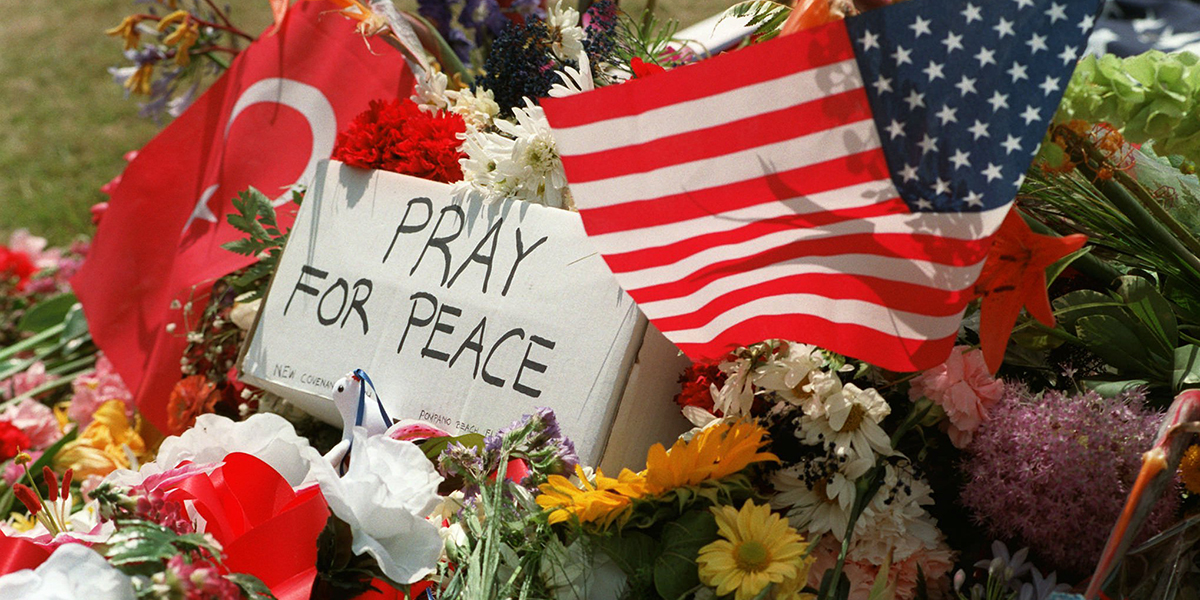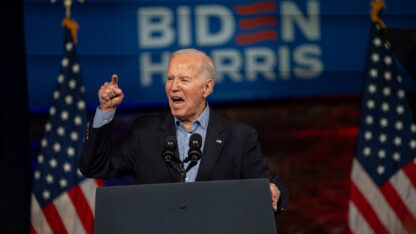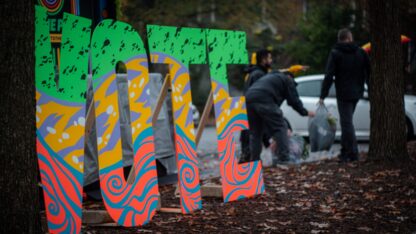Atlanta 1996 Olympics Bombing Victim Remembers The Night

Flowers and flags adorn the site of the bombing in Centennial Olympic Park Tuesday July 30, 1996 in Atlanta. Thousands of people visited the reopened park Tuesday, as the FBI continued its search for the bomber. (AP Photo/Bob Galbraith)
Bob Galbraith / Associated Press
This story is part of “Atlanta Remembers: The 1996 Olympics,” WABE’s series on the impact of the 1996 Summer Olympics on Atlanta, 20 years later. For more stories, click here.
Editor’s note: This story includes language and some descriptions of violence.
Early on the morning of July 27, 1996, at around 1:20 a.m., a bomb went off in Centennial Olympic Park. Calvin Thorbourne III, who lived in College Park at the time, was one of the thousands of people there. He spoke to WABE’s Dave Barasoain about that night.
I think I was actually in the bed that evening, and then I received a phone call from friends saying, “Hey, come meet us out at Centennial Park. And, you know, it’ll be fun.” And, you know, I don’t know: some kind of way I was peer-pressured into going out.
After walking around with everyone, I was tired. I was ready to go. I was really, really focused on cutting through the crowd and just getting to my car as quickly as possible. I was going downhill towards, I guess, in the direction of the World of Coke and all that. But there’s a crosswalk that’s right before John Portman [Boulevard].
I remember feeling a rush of wind from my left side, blowing from left to right. I felt just a pressure and a rush of wind. It went from, you know, just noise, and the air was saturated with music and voices to … silence. No one talking. And we’re talking thousands of people were out there, yet no noise right after the explosion.
I knew that something happened that probably was not planned, but I didn’t want to be around for the aftermath: that was my first thought. So I turned to my friends and said, “We need to get the f*** out of here.” And that’s not even how I speak normally. So obviously I felt that, you know, something major happened.
So I looked back, and my friend James was on the pavement. But he was sitting up. And he pointed down to his legs, which were bleeding. I was in shock. I looked down to my left leg, ’cause it felt a little odd, and my jeans were soaked on the left. It had blood. And I was like, “Aw, man.” Still not … I don’t know: I had some level of calm. I guess, because I was still standing up, I was thinking, “How injured could I possibly be?”
People came to my aid quickly. The first person that came to me was a gentleman who wanted to comfort me. But he drank a lot of beer. That was the only smell that I remember. “Hey, hey.” Lotta “h” words. “Hey. Everything’s gonna be OK. Just hang in there.”
And then I was like, “Wow. My right leg feels really scraped.” That’s how it felt. It felt like I scraped the back below my calf, and I looked at the right leg, and it looked like a chunk of skin. It looked like something hit me in the back of my leg, and it was just like a little bite.
And then they looked at that leg, and then everybody was like, “Oh, wow.” And they picked it up into the air, and they started to try to put pressure on that one. And then, I guess at some point, someone from Reuters must have taken a picture at that moment. The next day, the New York Times had that image on the cover.
I went to Piedmont, and I remember limping out of the ambulance, and they were lined up. I’ve never been admitted to a hospital that fast in my life, but they were very prepared.
I was able to be in a room by myself for a short period of time, and there was a phone on the wall. And I didn’t want my grandmother, who lived in New York City at the time, to turn on the news. She’s a worrier in general. So I said, “Let me call my grandmother and speak to her before she hears about this.” So I was able to pull the bed, which was on wheels, close to the phone.
I called her, and she said “Hey, baby.” And I said, “Um, I just wanted to tell you everything’s OK.” She said, “With what?” “Well, you know, there was like an explosion at the park. And I got hit with something, but I’m fine. I just wanted you to know that.” She said, “You did?” You know, she was very concerned, but I’m so glad I called her. She was OK when she heard me and could see that I sounded like myself.
I believe I discovered it was a bomb while in the hospital.
We started to hear the numbers. You know, 111 people injured and two people died as a result: one directly and one indirectly. Alice Hawthorne [a woman from Albany, Georgia, who died in the blast], God rest her soul, that was more sobering than just the fact that I was in a bombing. It really … it shakes you to your core when you found out, but for God’s grace or mercy, that you could have died.
I believe that the bombing made me a better person. It made me more appreciative. It made me more optimistic, if that could ever occur, because I really try to see the glass half-full. And I acknowledge bad things happen. And I know that life is not all rosy, but I believe that it’s what we perceive it to be.
I certainly believe that Atlanta really stepped up when the bombing occurred. And, you know, the South in general is known to be a friendly place. Even though I was making a little fun of the beer breath fellow, I completely appreciated his presence and everybody who kinda came around. Because the people that were helping me weren’t all, you know, paramedics. They just saw need and fulfilled it.
Atlanta really showed how much love we have for one another during that time.
Thorbourne still lives in the Atlanta area. He says he still carries a part of the bombing with him every day: he still has shrapnel in one of his legs.
9(MDAxODM0MDY4MDEyMTY4NDA3MzI3YjkzMw004))








